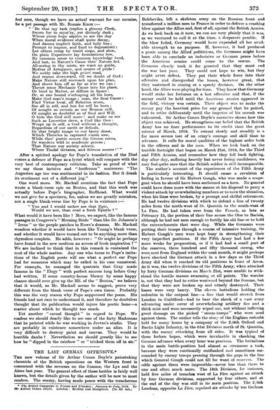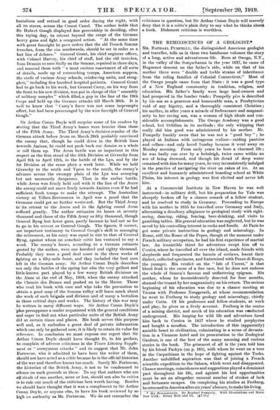THE LAST GERMAN OFFENSIVE.* THE new volume of Sir Arthur
Conan Doyle's painstaking chronicle of the British operations on the Western front is concerned with the reverses on the Somme, the Lys and the Aisne last year. The general effect of these battles is fairly well known, but the details given by the author will be new to most readers. The enemy, having made peace with the treacherous
• The British Campaign in France and Flanders : January to July, 1918. By Fir Arthur Conan Doyle. London : Hodder and Stoughton. [78. 6d. -net.] Bolsheviks, left a skeleton army on the Russian front and transferred a million men to France in order to deliver a crushing blow against the Allies and, first of all, against the British Armies. As we look back on it now, we can see very plainly that it was, as we ventured to call it at the time, a desperate gamble. If the blow failed, Germany would have expended all her avail- able strength to no purpose. If, however, it had produced a panic among the Allied politicians, the Germans might have been able to conclude an indecisive or German peace before the American armies could come to the rescue. The Germans clearly took it for granted that they must end the war last year. They could not hope to win, but they might avert defeat. They put their whole force into their offensive and disregarded the losses, however great, that they sustained in aiming at a speedy decision. On the other hand, the Allies were playing for time. They know that Germany would stake her fortunes on a last offensive and that, if the enemy could be held until the American armies appeared in the field, victory was certain. Their object was to make the enemy pay the heaviest price for any ground that he gained, and to retire deliberately until the impetus of his onrush was exhausted. Sir Arthur Conan Doyle's narrative shows how this object was achieved. He strengthens our belief that the British Army has no finer performance to its credit than the great retreat of March, 1918. To retreat slowly and steadily is a far more severe test of an army's courage and skill than to advance. It calls for moral qualities of the highest order both in the officers and in the men. When we look back on the terrible fortnight that began on March 21st, 1918, for the Third and Fifth Armies, and remember how they fell back fighting, day after day, suffering heavily but never losing confidence, we may feel quite sure that the British soldier is still incomparable.
The author's account of the experiences of the Fifth Army is particularly interesting. It should cause a revulsion of feeling in favour of Sir Hubert Gough, who was made a scape- goat when he should have been acclaimed as a hero. No general could have done more with the means at his disposal to parry a violent attack by overwhelming numbers or to save the situation, when his lines were broken, by a prompt and skilful retirement. He had twelve divisions with which to defend a line of twenty miles from the north-west of St. Quentin to the south-west of La Fare. He had taken ever from the French, as late as February 15, the portion of their line across the Oise to Barisis, although he had not men enough to fortify his old line or to hold the entrenchments that were dug. While the Germans were putting their troops through a course of intensive training, Sir Hubert Gough's men were kept busy in strengthening their very imperfect positions. If the Fifth Army had had a few more weeks for preparation, or if it had had a small part of the reserves, three hundred and fifty thousand strong, who were sent from England within the next month, it might perhaps have checked the German attack in a few days as the Third Army did when it reached its old positions in front of Arras. As it was, the twelve divisions of the Fifth Army, when attacked by forty German divisions on March 21st, were unable to with- stand the hostile masses swarming at all points. The wonder is, not that they had to retire westward beyond the Somme, but that they were not broken up and utterly destroyed. Their losses were very heavy. The eleven battalions holding the redoubts in the outpost line—a line that would stretch from London to Guildford—had to bear the shock of a vast army advancing under cover of overwhelming artillery fire and a - thick mist and were necessarily wiped out, not without inflicting great damage on the picked "storm-troops" who were used against them. The author tells the story of the Enghien redoubt held for many hours by a company of the 2 /4th Oxford and Bucks Light Infantry, in the 61st Division north of St. Quentin, with the enemy attacking from all sides. It was typical of these forlorn hopes, which were invaluable in checking the German advance when every hour was precious. The battalions in the main battle-position had almost as strenuous a task, because they were continually outflanked and sometimes sur- rounded by enemy troops pressing through the gaps in the line which General Gough could not fill for want of reserves. The odds against them were impossible—never less than three to one and often much more. The 18th Division, for instance, held five miles of trenches west of La Fare against an attack by four German divisions, supported by four others, and at the end of the day was still in its main position. The 2 /4th Londons, opposite La Fere, repulsed six attacks by ten Gerhaau battalions and retired in good order during the night, with all its stores, across the Crozet Canal. The author holds that Sir Hubert Gough displayed fine generalship in deciding, after this trying day, to retreat beyond the range of the German heavy guns and fight a rearguard action. " At the same time with great foresight he gave orders that the old French Somme trenches, from the rim southwards, should be set in order as a Last line of defence." General Grant, his chief engineer officer, with Colonel Harvey, his chief of staff, had the old trenches, from Demuin to near Sailly on the Somme, repaired in three days, and manned them with " a most curious assortment of all sorts of details, made up of entrenching troops, American sappers, the staffs of various Army schools, reinforcing units, and strag- glers," including five hundred hospital patients. General Grant had to go back to his work, but General Carey, on his way from the front to his new division, was put in charge of this " assembly of military samples" which filled.„a gap in the line of the 19th Corps and held up the German attacks till March 30th. It is well to know that " Carey-'s force was not some impromptu effort, but had been prearranged by the wise foresight of General Gough."
Sir Arthur Conan Doyle will surprise some of his readers by stating that the Third Army's losses were heavier than those of the Fifth Army. The Third Army's decisive repulse of the German attack before Arras on March 28th probably convinced the enemy that, though he could drive in the British lines towards Amiens, he could not push back our Armies as a whole or roll them up. The Arras battle was as important in this respect as the firm stand of the 55th Division at Givenchy from April 9th to April 12th, in the battle of the Lys, and by the let Division at the same place a week later. While we held Givenehy to the south and Ypres to the north, the enemy's advance across the swampy plain of the Lys was annoying but not necessarily dangerous. Thus in the earlier battle, while Arras was firmly held and with it the line of the Ancre the enemy could not move freely towards Amiens even if he had sufficient fresh troops to make the attempt. The Australian victory at Villers-Bretonneux in April was a proof that the Germans could get no further westward. But the Third Army in-its retreat to the Ancre and in the fighting round Arras suffered greatly. The author estimates its losses at seventy thousand and those of the Fifth Army as fifty thousand, though General Byng lost fewer guns, partly because he had not so far to go in his retreat as General Gough. The figures, if correct, are important testimony to General Gough's skill in managing the retirement, as his army was equal in size to that of General Byng, against whom no armchair critic has ventured to say a word. The enemy's losses, according to a German estimate quoted by the author, were one hundred and eighty thousand. Probably they were a good deal more in the three weeks of fighting on a fifty-mile front, and they included the best men left in the German army. Sir Arthur Conan Doyle describes not only the battles of the spring but also the very gallant and little-known part played by a few weary British divisions on the Aisne at the end of May, 1918, when the enemy attacked the Chemin des Dames and pushed on to the Marne. Those who read his book with care and who take the precaution to obtain a good map of the Somme valley will learn much about the work of each brigade and division and of many a battalion in those critical days and weeks. The history of this war may be written in many different ways. Sir Arthur Conan Doyle's "plan presupposes a reader acquainted with the general conditions and eager to find out what particular units of the British Army did at certain times and places. His book serves this purpose well and, as it embodies a great deal of private information which can only be gathered now, it is likely to retain its value for reference. In conclusion we must express our regret that Sir Arthur Conan Doyle should have thought fit, in his preface, to complain of adverse criticisms in the Times Literary Supple- ment as " anonymous attacks " and to suggest that Mr. John Fortescue, who is admitted to have been the writer of them, should not have acted as a critic because he is the official historian of the war and therefore knows too much. Surely Mr. Fortescue, the historian of the British Army, is not to be condemned to silence on such grounds as these. To say that authors who are all rivals of one another, more or less, should not also be critics is to rule out much of the criticism best worth having. Besides we should have thought that it was a compliment to Sir Arthur Conan Doyle, or anyone else, to have his book reviewed by so high an authority as Mr. Fortescue. We do not remember the criticisms in question, but Sir Arthur Conan Doyle will scarcely deny that it is a critic's plain duty to say what he thinks about a book. Dishonest criticism is worthless.







































 Previous page
Previous page